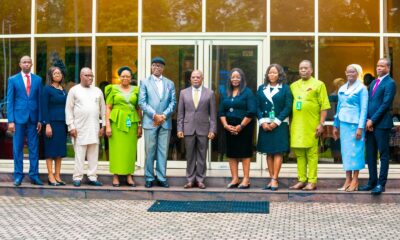Business
FIRS Blames Multiple Taxation For Failure Of Businesses
Federal Inland Revenue
Services (FIRS), in Abuja has blamed the failure of some businesses in the country on multiple taxation.
The Head, Micro and Small Tax Payers Department, Mr Koffi Abassi, said this at the 2013 National Revenue Summit organised by the Centre for Economic Research and Development.
The summit seeks to explore ways to improve revenue generation, allocation and monitoring in the three tiers of government.
He said that one of the factors contributing to multiple taxation was the contracting of private agents by some states to collect taxes on commission basis.
Abassi said that though it could be argued that the practice had resulted in improved debt recovery rate for some states, it, however, had a negative effect on the economy.
He said that one of the negative effects was the allegation of imposition of multiple charges on innocent businesses.
“When you use tax contractors you virtually have less control over their modus operandi.
“They are interested in using the means they feel expedient to get more commission even when the method applied is wrong.
“Because of all these, the National Economic Council (NEC) made up of the 36 governors and former heads of states among others recently resolved to abolish the use of tax contractors in the country.
“This is because of the perceived burden on citizens due to multiplicity of taxes imposed by these tax contractors,’’ he said.
Abassi advised states that want to use tax contractors to only engage them to play advisory roles.
He said that they could be also engaged in capacity building and education of the informal sector on the importance of paying tax.
The former Chairman, Senate Committee on Ethics, Code of Conduct and Privileges, Mr Omar Hambagda, said the legislature’s most important role was its function in budgetary allocations.
Hambagda in a paper on the role of the legislature in appropriating funds for government use said that legislative control of the country’s finances was meant to curb the excesses of the executive.
“The legislature has the final say in appropriating funds as they represent the people, therefore, better equipped to direct resources to areas that are most beneficial to them.
“The legislature can approve or reject out rightly, any demand for appropriation of funds, or accept it with modification and amendments when it deems it necessary,” he said.
Reports say that participants were drawn from State Houses of Assembles, Local Government Councils, States and Local Government Boards of Internal Revenue Service, among others.
Business
NCDMB, Dangote Refinery Unveil JTC On Deepening Local Content

Business
Industry Leaders Defend Local Content, … Rally Behind NCDMB

Business
Replace Nipa Palms With Mangroove In Ogoni, Group Urges FG, HYPREP

-
Business2 days ago
NCDMB Promises Oil Industry Synergy With Safety Boots Firm
-
City Crime2 days ago
RSG Tasks Federal Government On Maternal Deaths
-
News2 days ago
NOA Set To Unveil National Values Charter — D-G
-

 Featured2 days ago
Featured2 days agoRivers A Strategic Hub for Nigeria’s Blue Economy -Ibas …Calls For Innovation-Driven Solutions
-

 Rivers2 days ago
Rivers2 days agoNDDC Inaugurates Ultra-Modern Market In Rivers Community
-
Opinion2 days ago
Why Reduce Cut-Off Mark for C.O.E ?
-
News2 days ago
Nigeria’s Inflation Rate Dropped To 22.22% In June -NBS
-
Niger Delta2 days ago
Adopt African System Against Crime, Don Urges Security Agencies

